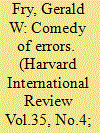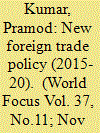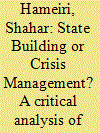|
|
|
Sort Order |
|
|
|
Items / Page
|
|
|
|
|
|
|
| Srl | Item |
| 1 |
ID:
156060


|
|
|
|
|
| Summary/Abstract |
Sukhwant S Bindra traces the changes in Chinese diplomacy over the past few decades, with special reference to India, Pakistan, other South Asian countries and Russia. He points out that the Sino–Pak alliance has grown out of converging interests, although Beijing is wary of Pakistan’s internal instability and support of Islamic radicalism in Asia. He concludes that India has no choice but to simultaneously collaborate with and stand up to China.
|
|
|
|
|
|
|
|
|
|
|
|
|
|
|
|
| 2 |
ID:
132536


|
|
|
|
|
| Publication |
2014.
|
| Summary/Abstract |
Political crises are nothing new for Thailand. Since becoming a constitutional monarchy in 1932, the country has faced numerous political crises, including a 1973 student revolution to overthrow a military dictatorship, the storming of Thammasat University and the installation of an extremely right-wing government in 1976, and the people power victory over General Suchinda in 1992. In September 2006, a military coup deposed the former prime minister, Dr. Thaksin Shinawatra. In retaliation against the coup, Thaksin supporters in 2006 formed the United Front for Democracy against Dictatorship (UDD), a political pressure group whose supporters are commonly called Red Shirts.
|
|
|
|
|
|
|
|
|
|
|
|
|
|
|
|
| 3 |
ID:
165570


|
|
|
|
|
| Summary/Abstract |
India concluded a fresh safeguards agreement (INFCIRC/754) with the International Atomic Energy Agency (IAEA) in 2009. All aspects of safeguards measures including the items to be safeguarded were deliberated upon, to ensure that India’s safeguards agreement does not result in giving any flexibility to India to use safeguarded items for unsafeguarded activities. The safeguards agreement INFCIRC/754 came with many additional features. Some of them are a result of the IAEA’s efforts to bring uniformity to subsidiary arrangements and structure and format for reporting requirements. Other features reflect India’s readiness to extend the provisions of INFCIRC/754 to previous safeguarded facilities. There have been quite a good number of publications on the contents of INFCIRC/754. An attempt has been made in this article to critically study the text of INFCIRC/754 and analyse and interpret the safeguards provisions therein to assess their functionality, adequacy and effectiveness.
|
|
|
|
|
|
|
|
|
|
|
|
|
|
|
|
| 4 |
ID:
145236


|
|
|
| 5 |
ID:
191647


|
|
|
|
|
| Summary/Abstract |
This article presents a comprehensive review of China’s emerging private space industry, including an analysis of government policies, investments and international relations. China’s private space industry has grown significantly since 1988, with over 60 startups emerging by 2022, thanks to the strong support from the government and military civil fusion. The industry’s focus on creating capabilities, skilled workforces, less reliance on foreign players, a strong funding base, and a Chinese space culture positions it to support China’s space ambitions and play a significant role in the global commercial space market. However, pursuing these goals has its own challenges. Therefore, the author provides a critical analysis of how government policies have enabled the growth of China’s private industry. The article also offers a perspective on India’s thriving space industry, encouraging it to explore commercial possibilities and implement domestic space reforms with long-term strategic goals in mind, especially with the emergence of the Indian Space Policy (2023).
|
|
|
|
|
|
|
|
|
|
|
|
|
|
|
|
| 6 |
ID:
088517


|
|
|
|
|
| Publication |
2009.
|
| Summary/Abstract |
Although the broad contours of India's nuclear doctrine were announced within the days of May 1998 nuclear tests, the formal doctrine was made public only five years later. This article will critically examine the evolution of India's nuclear doctrine in terms of the 1999 Kargil conflict and the 2001-2002 military confrontation with Pakistan. This article concludes that the one-page nuclear doctrine of 2003 remains sketchy and subject to varied interpretations. It would therefore be best to formally update or elaborate upon the nuclear doctrine, keeping in view key issues such as India's development of a Ballistic Missile Defence system
|
|
|
|
|
|
|
|
|
|
|
|
|
|
|
|
| 7 |
ID:
148104


|
|
|
|
|
| Summary/Abstract |
Indian diplomacy is on the fast track whether it is political or economic matter. Prime Minister Modi hinted it from the day one of his office that he has come with a vision and to fulfil it will need a speedy and concerted effort. He travelled to number of countries big or small and succeeded in establishing new relationship with them based on mutual trust and dependency more than before. Prime Minister’s untiring efforts are fetching result in the political arena and soon it is hoped it would be translated in the economic scenario too.
|
|
|
|
|
|
|
|
|
|
|
|
|
|
|
|
| 8 |
ID:
092492


|
|
|
| 9 |
ID:
085919


|
|
|
|
|
| Publication |
2009.
|
| Summary/Abstract |
The Regional Assistance Mission to Solomon Islands (ramsi), an Australian-led state-building intervention, has attracted considerable attention in policy-making and scholarly circles world-wide since its July 2003 inception. ramsi was lauded by the Development Assistant Committee of the oecd as a model for good practice to be followed by state builders elsewhere because of its perceived success in halting violent conflict and fostering a return to economic growth. The mission has had its critics too, but much of this criticism has centred on whether it was paying sufficient attention to the Melanesian social and cultural context. Such accounts fail to recognise that ramsi should not be viewed as a technocratic exercise in state building and capacity development by outsiders, but rather as a political project that seeks to transform the social and political relations within the Solomon Islands. This contribution critically examines the nature of this political project by focusing on the ways in which political power is (re)produced. By attempting to narrow the political choices available to Solomon Islanders, ramsi's programmes have ended up limiting the prospects for a sustainable political accommodation to emerge in the Solomon Islands. The deployment of coercive force in moments of acute crisis, as a way of managing the contradictions of attempts to build a 'state' through the production and reproduction of social and political power conducive to this project, reveals that rather than being a recipe for 'good' governance, ramsi remains a form of emergency rule.
|
|
|
|
|
|
|
|
|
|
|
|
|
|
|
|
| 10 |
ID:
188847


|
|
|
|
|
| Summary/Abstract |
There is a trend of upsurge in radicalisation of Sufi-Barelvis and violence resorted to by them, particularly in Pakistan, based on their uncompromising stance on the issue of blasphemy. Apart from its roots in various socio-political factors, strong emphasis on veneration of Prophet Muhammad makes Sufi-Barelvis extremely sensitive to any allegation of blasphemy. From print-media and Urdu press to social media and internet, the revolutionisation of the medium of communication in recent times has also played a key role in this radicalisation. Such interplay of ideology and technology is catalysing the twin processes of mobilisation and radicalisation.
|
|
|
|
|
|
|
|
|
|
|
|
|
|
|
|
| 11 |
ID:
155385


|
|
|
|
|
| Summary/Abstract |
Early warning—together with deterrence and military decisionmaking, comprising Israel’s national security “triangle”—became a central element of Israeli strategy in the second half of the 1950s. Since then, providing early warning of an impending conflict has become a priority and considered as the ultimate test for the Israeli Intelligence Community (IC) in general, and the Israel Defense Forces (IDF) Intelligence Directorate (AMAN) in particular. Yet, surprisingly, attempts to conceptualize and regulate early warning in Israel are relatively poor, especially when compared to the extensive conceptualization of early warning in other advanced Western countries. Indeed, the Israeli IC has attempted to differentiate between the types of early warning which its components are required to provide (understanding that early warning cannot be discussed as a monolith) that are intended to address a range of essentially different environments. At the same time, Israeli discourse on the subject continues to suffer from a lack of clarity and consistency, in the absence of a substantial theoretical foundation for the issue.
|
|
|
|
|
|
|
|
|
|
|
|
|
|
|
|
|
|
|
|
|